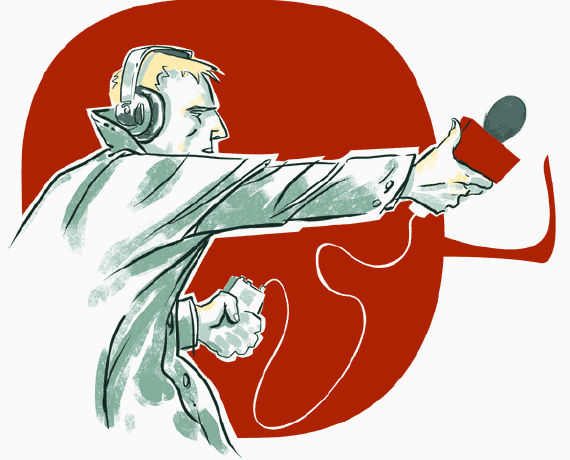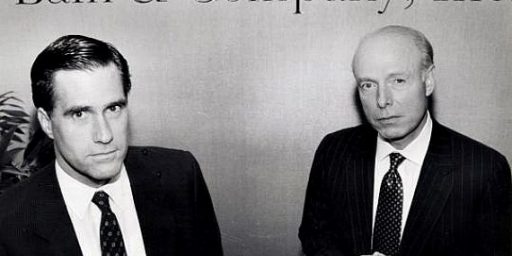Journalists As Opposition Researchers
Jonathan Chait makes an astute observation about the media's role in meme generation.
Jonathan Chait makes an astute observation: “Journalists Are Becoming Oppo Researchers and It Needs to Stop.”
Friday was not a great day for political journalism. The story driving campaign news was that President Obama said ”the private sector is doing fine,” which he meant in the same basic way that I did this week when I was slowly recovering from a horrendous head cold and told people I was “fine,” but which Republicans seized on as if to suggest he meant “ideal.” But what set me off (on an extended Twitter rant, in fact) was actually not that story but a Buzzfeed article headlined “Mitt Romney Struggles To Identify A Donut.” They’re sort of the same thing.
The story is a short video clip of Romney pointing at a plate of delicious-looking doughnuts and saying, “Can you see that one of those chocolate, um, uh, chocolate goodies finds its way to our ride?” He was almost certainly not struggling to identify a doughnut. Maybe he was looking for a more specific word to identify the subgenre of doughnut he was pointing at. Maybe he was trying to come up with a more general term than doughnut, and he settled on “goodies.” In any case, I am nearly certain Romney was not unfamiliar with doughnuts.
Did Buzzfeed think Romney didn’t know what a doughnut was? I would also guess the answer is: almost certainly not. Rather, Buzzfeed was engaged in a kind of meta judgment. Somebody else — liberal bloggers, Democrats, an MSNBC host — would use the video to make the case that Romney didn’t know what a doughnut was. Romney, as we all know, is extremely wealthy and often out of touch with the realities of middle-class existence, so it could be claimedthat he couldn’t identify a doughnut, and it would become another piece of evidence for what we all know to be true about Romney, and surely is true, even though it is not actually evidence of anything.
It’s obviously true that political campaigns will take their opponents’ statements out of context. That is probably unavoidable. The key step I’m focusing on here is when the journalist internalizes the work of the oppo researcher. Perhaps, in the end, the dumbest, least fair, most context-free interpretation of the line will ultimately prevail. But when journalists assume this will happen and make no effort to fight against that process, we go from merely reporting on the stupidity of politics to becoming accomplices of it.
The incentives are powerfully in the opposite direction, alas.
With the proliferation of media outlets and rise of aggregators and social media, fewer and fewer of us are consuming information in the way we did even a few years ago. As recently as 2004 or so, I read newspapers, watched specific television news and news commentary programs, and visited individual websites on a daily basis. Now, though, I consume my news in individual servings based on links that pop up on a couple of aggregation sites, my curated Twitter feeds, and my Google Reader feed. Indeed, Chait’s piece appears in New York magazine. I read perhaps half a dozen stories from that site a month–all via referral links. I don’t think I’ve ever intentionally visited the site otherwise.
While I’m more tech forward than most–certainly, most people of my generation–most under-60s are following a similar path.
What this means is that fewer and fewer loyal readers/viewers exist. In the old days, people just watched CBS Evening News and read the New York Times every day and read a few magazines every month. Consequentially, editors and producers could simply decide what news their audience ought to be aware of and craft it according to their own sensibility in terms of style, substance, and spin. Now, though, the impetus is on creating a clever headline or otherwise creating a meme that will get passed on through Twitter, Facebook, or other ways. That’s particularly the case for startups like Buzzfeed, who have zero built-in readers.
In turn, most of us in the commentariat race to jump on these memes early in order to put our spin on them. In the case of OTB, the spin is usually some version of “this meme is horseshit” or this “Outrage of the Day isn’t actually outrageous.” But just acknowledging the meme helps perpetuate it.
There’s no obvious way out of this cycle. To simply ignore most of these stories is not only disadvantageous from a business standpoint–like it or not, they drive substantial traffic–but contributes to the disinformation. Once the story has gone viral, a large number of people will believe it to be true, either because it confirms their pre-existing prejudice or because they only see the headline and don’t bother to read the story. Just as campaigns have no real alternative but to respond to their opponent’s distortions, pundits have little choice but to weigh in.







I hate to break it to you, James, but this is absolutely nothing new. Just one example: the New York Times endorsed John McCain in 2008. Then, once he sewed up the nomination, they dropped a completely bogus “McCain is having an affair with a lobbyist” story.
I’m glad you finally woke up to it, and note that it took a shot at Obama to open your eyes…
Well, let’s just be honest and blunt about it. Journalists are not the sharpest tools in the shed.
What exactly does it take to receive a journalism degree? Other than a pulse and two functioning hands? There’s no equivalent to the GMAT, or to the LSAT, or the MCAT, or even to the GRE. What does it take to be employed as a journalist? There’s no licensing mechanism. No peer review mechanism. Shit, there are 18 year-old real estate agents out there with higher qualifications. They have to pass a professional test and obtain a professional license. Pharmacy techs making $15/hour have higher qualifications. Medical billing coders. Hazmat truck drivers. EMTs. Fifty other vocations.
When you combine the absence of any legitimate screening mechanism with an obvious political slant and a craven desire for more ratings the inevitable result is what we all see and hear on a daily basis: pure schlock.
No, come on, you guys. Mitt Romney doesn’t know what a donut is. Why would Buzzfeed say it if it wasn’t true?
Sturgeon’s Law applies to long election cycles.
@john personna: Sturgeon’s law applies to everything. Including blogs, blog comments, blog writers and blog readers.
Did James Joyner just type “alas?” Who do you think you are, Steven Taylor?
@John Burgess: Sturgeon’s Law applies to everything except Theodore Sturgeon’s body of work.
Also…while this is no doubt true:
How they do so is key. One can weigh in on Chris Hayes without pretending to be scandalized, for instance. One can also discuss a clumsy sound bite without caricaturing it, too.
When you’re used to having the help go out to get donuts, doing it yourself can present problems.
@Herb:
What is a “pundit” these days? Someone who must have 3 to 5 opinions, every day, no matter what?
If that’s true, Sturgeon’s Law becomes inevitable.
@Jenos Idanian #13:
That may be what McCain railed against in his press conference and what everyone assumed was the implication, but what the article actually claimed was that McCain spent an inordinate amount of private time with, flew around on private jets with, etc an attractive lobbyist and that this had made a number of his staffers exceedingly uncomfortable. The story said nothing about sexual encounters, it was more focused on the idea that she was flattering/flirting with him in order to, successfully, get her client’s interests written into legislation.
@Tsar Nicholas: If you’re talking about simply starting a blog, there is no threshold. If you’re talking about becoming a columnist for a major newspaper or magazine, it usually requires a degree from a very prestigious university and often a graduate or professional degree. George Will was a Rhodes Scholar and holds a PhD from Princeton. Charles Krauthammer was a Commonwealth Scholar and got his MD from Harvard. Bill Kristol has his PhD from Harvard. Thomas Friedman went to Oxford on a Marshall scholarship and got his MPhil. Some, like Maureen Dowd, just have a bachelor’s degree and worked their way up in journalism.
I think the requirement to publish something profound weekly, twice weekly, or thrice weekly–and for it to fit neatly into an 800 word format–makes it nearly impossible to succeed over the long run. Eventually, you’ve said everything you have to say and it gets stale.
@Herb: Agreed, although it’s harder than it sounds. The problem is that most of the people weighing in on those controversies simply don’t know the background. If you’ve never watched Chris Hayes’ show, it’s pretty easy to see the quote taken out of context, note that he works for The Nation and MSNBC, and draw cheap conclusions.
@john personna: Blogging definitely encourages that behavior. Because one never knows what content will go viral, the safe thing is to crank out a dozen or so posts a day and hope something sticks. I did that for years before life circumstances made that harder to do, both from the standpoint of time and energy available and from sheer enthusiasm to do so. I weigh in much less often now, for good or ill.
*cough*Mataconis*cough*
Wow…. Who’da thought a college education could ever be so wasted. 😉
@James Joyner:
Wow, this explains so much.
And you know this because you consume it all!!!
Hey…
@James Joyner:
Ah yes, the Doug Mataconis playbook.
@James: Oddly enough, I’d have called it either the WR or the Hey Norm playbook — for at least one of them, it’s their favorite go-to talking point.